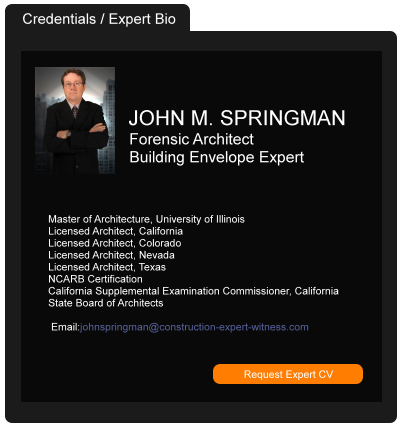Florida Appeals Court Rules in Favor of Homeowners Unaware of Construction Defects and Lack of Permits
December 09, 2011 —
CDJ STAFFThe Florida Court of Appeals has ruled that a homeowner is not liable for defects in unpermitted alterations, reversing a lower court’s decision in Jensen v. Bailey. The Jensens sold their house to the Baileys. During the sale, the Jensens filled out a property disclosure statement, checking “no” to a question about “any improvement or additions to the property, whether by your or by others that have been constructed in violation of building codes or without necessary permits.”
After moving in, the Baileys discovered several problems with the home. One involved a defective sewer connection leading to repeated backups. The Baileys also found problems with remodeling the Jensens had done in the kitchen, master bath, and bedroom. The remodeling work was not done with required permits nor was it up to code.
The court noted that an earlier case, Johnson v. Davis, established four criteria: “the seller of a home must have knowledge of a defect in the property; the defect must materially affect the value of the property; the defect must not be readily observable and must be unknown to the buyer; and the buyer must establish that the seller failed to disclose the defect to the buyer.” The court found that the first of these criteria was crucial to determining the case.
In the Johnson ruling, the then Chief Justice dissented, fearing that the courts “would ultimately construe Johnson’s requirement of actual knowledge to permit a finding of liability based on constructive knowledge,” quoting Justice Boyd, “a rule of constructive knowledge will develop based on the reasoning that if the seller did not know of the defect, he should have known about it before attempting to sell the property.” The Appeals Court concluded that the lower court hit this point in ruling on Jensen v. Bailey.
Citing other Florida cases, the court noted that the Johnson rule does require “proof of the seller’s actual knowledge of the defect.” The court cited a case in which it was concluded that the seller “should have known” that there was circumstantial evidence was that the seller did know about the defects, as the seller had been involved in the construction of the home.
In the case of the Jensens, the lower court concluded that they did not know that the work was defective, nor did they know that they were obligated to obtain permits for it. The Appeals Court found this one fact sufficient to reverse the decision and remand the case to the lower court for a final judgment in favor of the Jensens.
Read the court’s decision…
Read the court decisionRead the full story...Reprinted courtesy of
ASCE Statement on The Partial Building Collapse in Surfside, Florida
June 28, 2021 —
Tom Smith - American Society of Civil EngineersThe following is a statement by Tom Smith, Executive Director, American Society of Civil Engineers (ASCE):
WASHINGTON, DC. – We are saddened by the tragic news coming out of Surfside, Florida, regarding the fatal partial building collapse of a condominium early Thursday morning. Safety is the top priority of every civil engineer, and protecting public health and safety is core to our mission at ASCE. We share our deepest condolences to all of those affected by this tragedy.
Collapses like these are fortunately highly unusual and extremely rare. However, it is imperative to identify the root cause of failures when they do occur, and to ensure that proactive steps are taken to prevent future incidents. ASCE fully supports the need for continued engineering assessments to pinpoint the cause of the collapse, and we stand ready to support official investigations with technical expertise and advice available through our 150,000 civil engineer members worldwide.
While rescue and recovery operations are underway, it is important that we support our first responders who are conducting essential rescue efforts and are operating as quickly as possible. We will also continue to keep those who have been injured and those who have not yet been accounted for in our hearts and thoughts, and we share our heartfelt sympathies to all of those affected.
ABOUT THE AMERICAN SOCIETY OF CIVIL ENGINEERS
Founded in 1852, the American Society of Civil Engineers represents more than 150,000 civil engineers worldwide and is America's oldest national engineering society. ASCE works to raise awareness of the need to maintain and modernize the nation's infrastructure using sustainable and resilient practices, advocates for increasing and optimizing investment in infrastructure, and improve engineering knowledge and competency. For more information, visit www.asce.org or www.infrastructurereportcard.org and follow us on Twitter, @ASCETweets and @ASCEGovRel.
Read the court decisionRead the full story...Reprinted courtesy of
Attorneys’ Fees Are Available in Arizona Eviction Actions
December 19, 2018 —
Ben Reeves - Snell & Wilmer Real Estate Litigation BlogThe Arizona Court of Appeals recently held that any successful plaintiff in a forcible detainer action (i.e., an eviction action) may recover an award of its attorneys’ fees and costs incurred at trial under A.R.S. § 12-1178(A). See Bank of New York v. Dodev, 1 CA-CV 17-0652 (Ct. App. Nov. 20, 2018). Prior to this decision, caselaw held that fees were only awardable in actions arising out of the termination of a residential lease. RREEF Mgmt. Co. v. Camex Prods., Inc., 190 Ariz. 75, 945 P.2d 386 (Ct. App. 1997). Changes to the statute, however, rendered the prior caselaw obsolete. Although the holding in Dodev is important, the facts of the case are truly astonishing…and somewhat depressing.
The Facts
In Dodev, Ivaylo Dodev (Dodev) defaulted on his home loan in 2008. He nevertheless “succeeded in remaining on the [p]roperty by filing numerous legal actions that delayed the foreclosure and subsequent trustee’s sale” at least through the date of the opinion—a ten (10) year period.
Read the court decisionRead the full story...Reprinted courtesy of
Ben Reeves, Snell & WilmerMr. Reeves may be contacted at
breeves@swlaw.com
Following Pennsylvania Trend, Federal Court Finds No Coverage For Construction Defect
December 08, 2016 —
Tred R. Eyerly – Insurance Law HawaiiBound by Pennsylvania law, the federal district court found there was no coverage for defects in the installation of a roof. State Farm Fire & Cas. Co. v. Kim's Asia Constr., 2016 U.S. Dist. LEXIS 138915 (E.D. Pa. Oct. 5, 2016).
Kim's Asia Construction contracted to remove and dispose of Powerline Imports, Inc.'s roof, and then install a new roof. After completion of the project, Powerline sued, alleging that Kim's Asia's negligent construction of the roof caused the roof to leak, even in minor rain storms. Kim's Asia made additional repairs, but the leaks continued. Powerline had to hire a new contractor to remove and dispose of the roof and install another roof. Powerline then sued Kim's Asia.
Read the court decisionRead the full story...Reprinted courtesy of
Tred R. Eyerly, Insurance Law HawaiiMr. Eyerly may be contacted at
te@hawaiilawyer.com
Quick Note: Attorney’s Fees and the Significant Issues Test
November 03, 2016 —
David Adelstein – Florida Construction Legal UpdatesAttorney’s fees become a component of damages that parties seek to recover whenever there is a contractual or statutory basis for them to recover their fees. Parties want to be able to recover all or substantially most of the attorney’s fees they incurred in pursuing their claim. (In my experience, recovering all of the fees incurred is very challenging.) But, to be entitled to attorney’s fees, a party has to be deemed the
prevailing party. There is the sentiment that as long as you recover a positive net judgment (even if it is for $100 when your claim was for $50,000) then you will be able to recover your attorney’s fees which will likely exceed the amount that was ever in dispute.
Read the court decisionRead the full story...Reprinted courtesy of
David Adelstein, Katz, Barron, Squitero, Faust, Friedberg, English & Allen, P.A.Mr. Adelstein may be contacted at
dma@katzbarron.com
Miller Act Statute of Limitations and Equitable Tolling
July 11, 2022 —
David Adelstein - Florida Construction Legal UpdatesWhen it comes to a Miller Act payment bond claim, there is a one-year statute of limitations—“The Miller Act contains a statute of limitations provision that requires actions to ‘be brought no later than one year after the day on which the last of the labor was performed or material was supplied by the person bringing the claim.’” U.S. f/u/b/o Techniquex Specialty Flooring, Inc., v. Philadelphia Indemnity Ins. Co., 2022 WL 169070, *3 (M.D.Penn. 2022) (citing the Miller Act).
There is an argument, albeit a difficult one, to support an equitable tolling of the one-year statute of limitations. This would be an argument filed when the one-year statute of limitations expires, but there is reason for missing the statute of limitations caused typically by the overt misleading of the defendant (surety/bond-principal):
“Equitable tolling functions to stop the statute of limitations from running where the claim’s accrual date has passed.” “Equitable tolling is appropriate in three situations: (1) when the defendant has actively misled the plaintiff respecting the facts which comprise the plaintiff’s cause of action; (2) when the plaintiff in some extraordinary way has been prevented from asserting his rights; and (3) when the plaintiff has timely asserted his rights in the wrong forum.” The first ground for equitable tolling“appears to be the same, in all important respects” to equitable estoppel, which “excuses late filing where such tardiness results from active deception on the part of the defendant” and “what courts describe as ‘equitable tolling’ is encompassed by the latter two parts of our Circuit’s doctrine.” The extraordinary circumstances standard may be met “where the defendant misleads the plaintiff, allowing the statutory period to lapse; or when the plaintiff has no reasonable way of discovering the wrong perpetrated against her …”
Tehniquex, supra, at *5 (internal citations omitted).
Read the court decisionRead the full story...Reprinted courtesy of
David Adelstein, Kirwin Norris, P.A.Mr. Adelstein may be contacted at
dma@kirwinnorris.com
Supreme Court Holds That Prevailing Wage Statute is Constitutional
November 28, 2022 —
Cassidy Ingram - Ahlers Cressman & SleightThe Supreme Court recently held
[1] that Senate Bill 5493 (“SSB 5493”), which alters the method for how the Washington State Department of Labor and Industries’ industrial statistician sets the prevailing wages for employees on public works projects, is constitutional. Prior to the enactment of SSB 5493, the industrial statistician set prevailing wages for each trade on a county-by-county basis based on either the majority or average wage rate in that specific county. Following SSB 5493’s enactment, the industrial statistician would be required to adopt the prevailing wage rate for a county solely based on collective bargaining agreements (CBAs) for that trade. If a trade has more than one CBA in a county, the highest wage rate will prevail.
SSB 5493 has negative impacts on employers because it creates the potential for wage rates to be set based on CBAs that represent the minority of hours worked in a county. The International Union of Operating Engineers, Local 302, provides an example of this. AGC began negotiations with an operators’ union for a master labor agreement, which would cover almost all operating engineers in 16 Washington State counties. When they could not reach an agreement, Local 302 called a strike against the employers. After one week of the strike, Local 302 approached small employers and negotiated a side agreement. Some of these employers were also card-carrying members of Local 302. A few weeks later, AGC ratified a new agreement with Local 302 that included lower wages than the side agreements. Because the rates in the side agreement were higher, those wage rates became the prevailing wage in 16 counties even though they represented a minority of the hours worked.
Read the court decisionRead the full story...Reprinted courtesy of
Cassidy Ingram, Ahlers Cressman & SleightMs. Ingram may be contacted at
cassidy.ingram@acslawyers.com
Ensuring Arbitration in Construction Defect Claims
February 04, 2013 —
CDJ STAFFJared E. Berg and John W. Mill of Sherman & Howard note that developers and general contractors would prefer that construction defect claims against them go to arbitration, instead of ending up in front of a jury. They say “there is a way to do this.” For the developer and general contractor, arbitration is “typically less costly and time consuming than litigation.”
On the other side, home owner associations “tend to prefer litigation because the up-front costs of arbitration are greater and they would rather have their cases tried to a jury than a panel of arbitrators in the belief juries offer greater potential for high damage awards. In order to avoid arbitration, “HOAs have taken advantage of their statutory rights to amend declarations by instructing their members to approve amendments removing arbitration clauses.
However, in a recent Colorado case, the developer had taken a precaution of including in the arbitration clauses that “they could not be removed from the declarations by amendment with the developer’s and general contractor’s consent.” The homeowners association had voted to remove these clauses, but the judge found that they could not do so.
Berg and Mill give the advice to “include in the declaration’s arbitration clause a provision making your consent required to amend or nullify the arbitration provision,” adding that “courts will enforce this kind of consent provision.”
Read the court decisionRead the full story...Reprinted courtesy of


































































